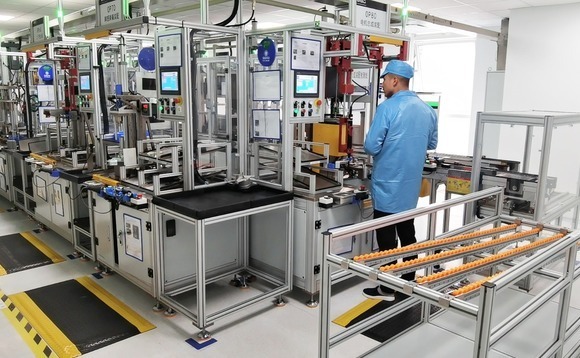
Deal focus: Bibo puts the smart into chassis

Tsinghua University spinout Bibo has stolen a march on its local rivals in developing a specific electric vehicle component that has a large addressable market and serves as an import substitution play
The electric vehicle (EV) supply chain – which includes manufacturers of not only vehicles, but also the batteries, smart cockpits, and semiconductors that sit inside them – appears to be largely immune to China's PE slowdown. Last year, deployment across all sectors dropped from USD 129.7bn to USD 64.4bn, yet EV makers alone raised USD 5.5bn, up from USD 2.5bn in 2021, according to AVCJ Research.
The latest example is automotive parts supplier Bibo. Founded in May 2021, the company produces actuators for next-generation intelligent chassis – they convert signals from the control unit into braking and steering actions. Bibo represents a domestic alternative to solutions normally procured overseas.
The company has completed four funding rounds to date. Most recently, Nio Capital and Orient Jiafu Asset Management led a CNY 200m (USD 29m) Series A, with participation from the likes of CWB Automotive Electronics and Addor Capital. The valuation of CNY 900m is double that achieved by Bibo in its prior round in June 2022.
CEO Xiaohui Liu said the Series A was fully subscribed by December, within three months of launch, and the final close was only pushed out because investors needed more time to complete the paperwork.
Bibo's business model offers some reassurance to renminbi fund investors that typically prioritise near-term cash flow over long-term growth potential. Delivery of the company's first batch of products began this month, and it is projected to hit 400,000 units and CNY 150m in revenue over the next half-year.
The Series A proceeds will be used to build two new digital production lines to handle these orders. Approximately CNY 100m has already been invested in fixed assets, predominantly production facilities. Bibo plans to return to market in May to top up its cash reserves and support expansion into the US and Australian markets. It is open to receiving commitments from renminbi and US dollar funds.
"We believe the market for intelligent chassis solutions in China can be worth CNY 50bn and penetration is increasing rapidly. By 2026, 50%-60% of all cars, not just EVs, will use this product," said Liu. "This year and next year will be highly competitive as the technology continues to mature."
Smart actuators - as part of an intelligent chassis solution - are an essential component in autonomous driving and advanced driver-assistance system (ADAS). If the driver isn't paying attention and fails to notice an obstacle, the car's sensors and computer intervene and a smart actuator is instructed to apply the brake. All of China's top EV manufacturers rely on ADAS and smart actuators.
These components also enable energy recycling. The kinetic energy generated when a car applies the brakes is typically converted into heat and dissipated into the air. A smart actuator can convert this energy into electricity, increasing a vehicle's range by up to 20%.
Securing a first customer is always a breakthrough moment for a start-up, especially when the target segment comprises large enterprises. Bibo signed up five last year, including leading independent and state-backed carmakers, and they have collaborated on 12 vehicle models. The breakthrough was reasonably straightforward, according to Liu, and it relates to the Bibo origin story.
The founding team spun out from an automotive research lab at Tsinghua University. The lab - known as the State Key Laboratory of Automotive Safety & Energy - had been working with local carmakers and component suppliers since 1996, creating fertile territory for start-ups. More than a dozen have emerged and three or four of them are currently preparing for IPO.
"These previous spinouts helped establish our reputation in the market," said Liu. "In addition, the lab has worked with many OEMs [original equipment manufacturers]. We developed products from scratch according to their needs, completed all the necessary adjustments and debugging, and delivered millions of product sets. That experience of mass-volume delivery gave confidence to our customers."
In 2018, Liu's team began developing a highly integrated one-box actuator solution that differed from the two-box split-set design offered by Bibo and most of its peers to date. A large Chinese OEM expressed an interest in collaborating on the project last year and full commercialisation is expected to begin in the second half of 2023. It usually takes 6-18 months for a project to achieve mass commercialisation.
"A highly integrated product takes a long time to verify and launch into mass production. As a result, 80% of our revenue will come from the split-type products this year. We want to reduce that to 20% by 2025, with the rest coming from highly integrated products," said Liu.
Latest News
Asian GPs slow implementation of ESG policies - survey
Asia-based private equity firms are assigning more dedicated resources to environment, social, and governance (ESG) programmes, but policy changes have slowed in the past 12 months, in part due to concerns raised internally and by LPs, according to a...
Singapore fintech start-up LXA gets $10m seed round
New Enterprise Associates (NEA) has led a USD 10m seed round for Singapore’s LXA, a financial technology start-up launched by a former Asia senior executive at The Blackstone Group.
India's InCred announces $60m round, claims unicorn status
Indian non-bank lender InCred Financial Services said it has received INR 5bn (USD 60m) at a valuation of at least USD 1bn from unnamed investors including “a global private equity fund.”
Insight leads $50m round for Australia's Roller
Insight Partners has led a USD 50m round for Australia’s Roller, a venue management software provider specializing in family fun parks.








